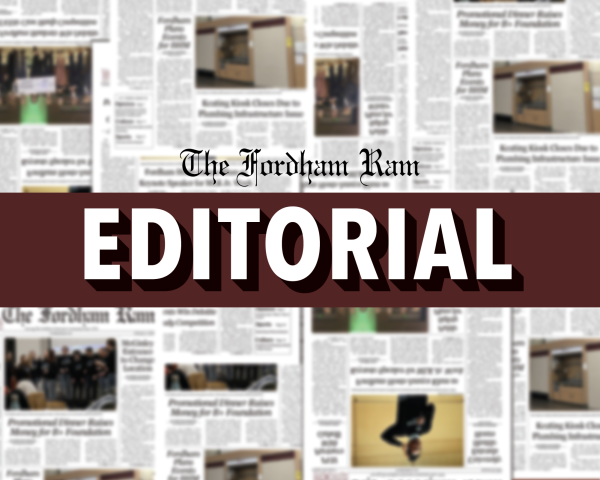Learn From Our Location
The Bronx has been solidified in history as an innovative and influential force and continues to prove itself as such each day.

The Bronx is not your typical “college town.”
The area grew to become a bustling urban center independent of Fordham University opening its gates in 1841, and will continue to be a self-sufficient entity with or without our help.
This is not to say the university and its community members do not add value to the surrounding neighborhood. In fact, a major goal of all students, alumni and faculty should be to positively impact the borough during their time here and after.
However, the Bronx will go on, and that simple fact is part of what gives our experience here as Fordham students the potential to be so meaningful.
The Bronx is and always has been a microcosm for larger conversations being had across the state, nation and globe. It is a rare opportunity to view, firsthand, the vast progress and problems of an entire country in your own backyard.
There is something touching about a quintessential “college town,” the kind that lives and breathes for its respective university and in return receives sustenance in the form of population, income and general happenings. There is a charm in such unity of ethos, in the underlying understanding that everyone is there for or because of the same collegiate-oriented reason.
However, like schools in other cities, Fordham students are only one part of the diverse landscape that makes up the Bronx. Our sense of purpose makes for only a facet of a manifold collective, and such diversity of thought provides a unique opportunity to challenge, encourage and push forward our on-campus conversations, as well.
Universities themselves are typically hotbeds for progressive thought, movements and action, but it is less common for their surrounding communities to share those same tendencies.
The birthplace of hip-hop, the badass yet nurturing step-parent of graffiti art, the congressional district of Alexandria Ocasio-Cortez (AOC): the Bronx has been solidified in history as an innovative and influential force and continues to prove itself as such each day. We exist in a time of massive cultural change in a tangible hub of this very change.
A radical symbol in and of herself, AOC is the embodiment of a host of societal shifts in terms of community-mindedness: a powerful increase in millennial/youth activism, a rise of diversity in mainstream voices, a general call for more drastic leftward policy changes.
In February, AOC introduced the “Green New Deal” in an attempt to create legislative-backed action aimed at remaking the U.S. economy and eliminating all U.S. carbon emissions, and her push to center climate-based dialogue has been invaluable to the advancement of the overall conversation.
On Sept. 5, CNN hosted a seven-hour town hall with 10 Democratic candidates here in New York that focused solely on issues surrounding climate change, making the event the longest amount of time climate change has ever been discussed on American television.
As a point of reference, climate change coverage on nightly news networks and Sunday morning political shows totaled at 142 minutes in 2018 and 260 in 2018. ABC News, in particular, spent more time discussing the royal baby (over the course of one week) than on the entire climate crisis (over the course of one year).
Simply put, AOC is a driving factor in the mainstream climate conversation, and regardless of one’s political stance on the matter, it’s important to recognize she began that discussion in our borough.
The Bronx presents us with some less encouraging trends, as well. Many apartment buildings once owned by local landlords are being bought and refurbished by corporate-run management companies that operate remotely. Unlike other areas in New York City, whose gentrification processes are in their later stages, the Bronx is experiencing such shifts right before our eyes.
These circumstances create an opportunity for students to grapple with the question of being gentrifiers themselves, to become aware of their place within a shifting collective and to examine the way their existence inherently impacts others’.
The questions the Bronx poses to us are precisely the ones being asked across the country, and as a result, have the potential to expose us to discussions that are at once extremely difficult and incredibly meaningful, if we decide to embark on them.
So, to newcomers to the Fordham community: take part in the greater pool you now find yourself in. Make getting to know the Bronx a priority, not just Fordham’s campus. Accept the challenge to think critically about things that might prove uncomfortable or unfamiliar.
To those who have been here and who know its charms intimately: do not forget the richness of the place you find yourself in, and do not take it for granted. Continue to examine your role within the larger collective and encourage others to do the same. Do not settle into a busied negligence or fantasies of an impending future because, for some of us, our time in the Bronx will end with the obtainment of our respective degrees.
For Fordham students, the ingenuity of the Bronx makes for a wonderful college experience. Make sure to take advantage of the ever-changing cultural hub you have the opportunity to evolve alongside while you are still here.












































































































































































































